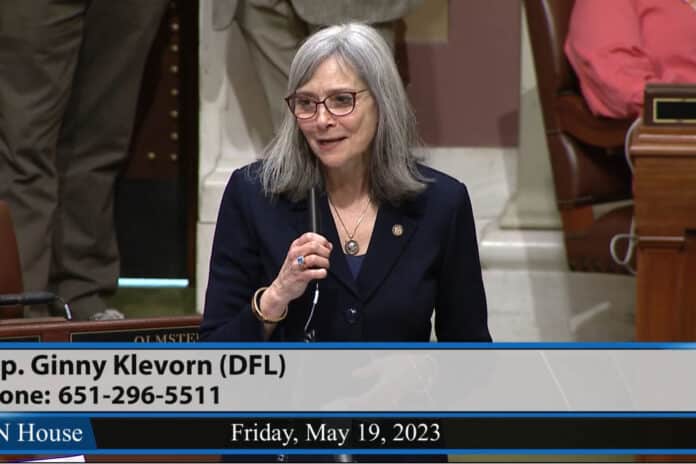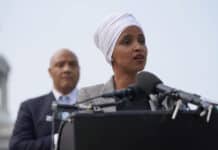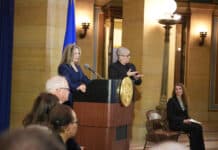
Is HF1830 a bill that funds state government operations? Or is it an “elections bill?”
It depends who you ask.
Rep. Ginny Klevorn, DFL-Plymouth, who carried the bill in the House, says it’s maybe a little bit of both.
And that’s because several of the provisions tucked inside a 300-page conference report for the bill that will increase state government operations expenditures by 40 percent over the next two years focus on election reforms pushed by the DFL “trifecta” this session that didn’t earn the support of Republicans.
“I find state government pretty exciting,” Klevorn said Friday as the House voted 69-62 (along party lines) to pass a final version of the bill that will increase state government operations spending by $410 million in the next biennium. “I take exception to the fact that this is called an ‘elections bill.’ It is partly an elections bill. But it’s so important that we have a functional state government that works for Minnesotans.”
The Senate adopted the conference report on the bill in a 34-31 vote. The bill now heads to the desk of Gov. Tim Walz.
Republicans said Friday they voted down the $1.5 billion omnibus state government (and elections) package not because it contained a number of appropriations to fund state government operations, but because it includes a number of “bad” elections-related provisions such as:
- Signing Minnesota onto the National Popular Vote Compact;
- A new law that will increase the threshold for a political party to attain or maintain “major party” status from 5 percent to 8 percent beginning in the 2024 general election;
- Requiring the secretary of state to create a commission to study the possibility of instituting statewide ranked choice voting;
- Requiring all post-secondary institutions to increase facilitation of voter outreach to students through a voter engagement plan;
- Expanding early, “live ballot-box,” in-person voting statewide from seven days to 18 days.
“This is a bad bill for elections, not because the provisions are bad, but because the way it was assembled, the way it was put together was in a very partisan fashion,” said Rep. Paul Torkelson, R-Hanska.
Other provisions in the bill include:
- Creating a commission to redesign the state seal and state flag;
- Replacing Columbus Day as a state holiday with Indigenous Peoples Day.
Spending provisions in the bill include:
- A nearly $141 million increase in new spending on informational technology services across state government agencies;
- A $74 million increase for legislative operations in the House and Senate, including a $3,500 salary increase for House members;
- An allocation of about $65 million to the Department of Administration for equity oversight grants, green building initiatives, and a newly established Office of Enterprise Management & Sustainability;
- A nearly $38 million increase for the Office of the Attorney General that proponents claim will fund technology upgrades and salary increases to “attract and retain top talent;”
- An almost $11 million increase in the budget for the Office of the Governor;
- A $5 million increase in the budget for the Office of the State Auditor.
Hank Long
Hank Long is a journalism and communications professional whose writing career includes coverage of the Minnesota legislature, city and county governments and the commercial real estate industry. Hank received his undergraduate degree at the University of Minnesota, where he studied journalism, and his law degree at the University of St. Thomas. The Minnesota native lives in the Twin Cities with his wife and four children. His dream is to be around when the Vikings win the Super Bowl.













